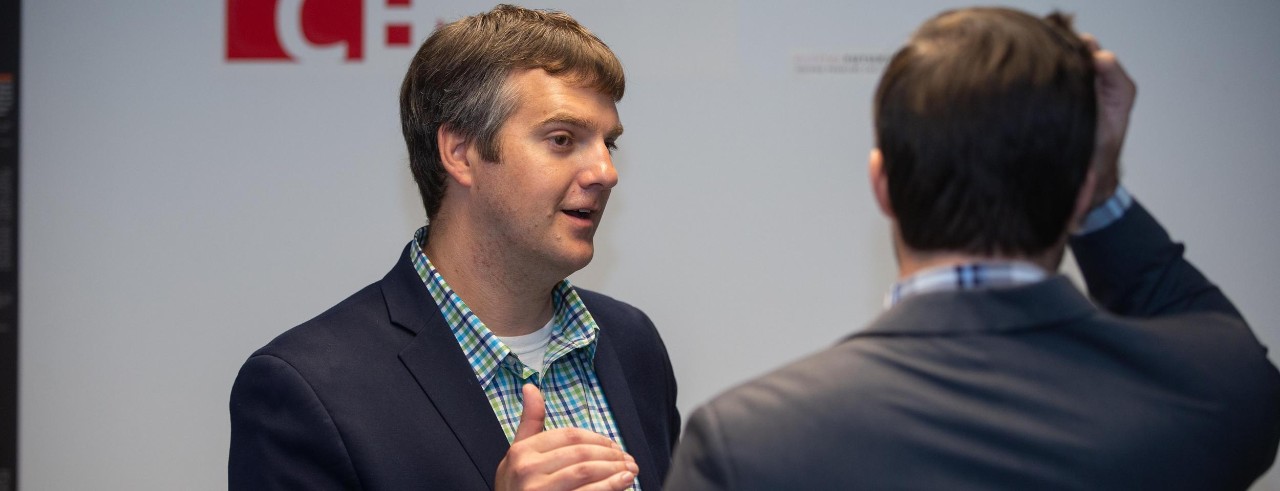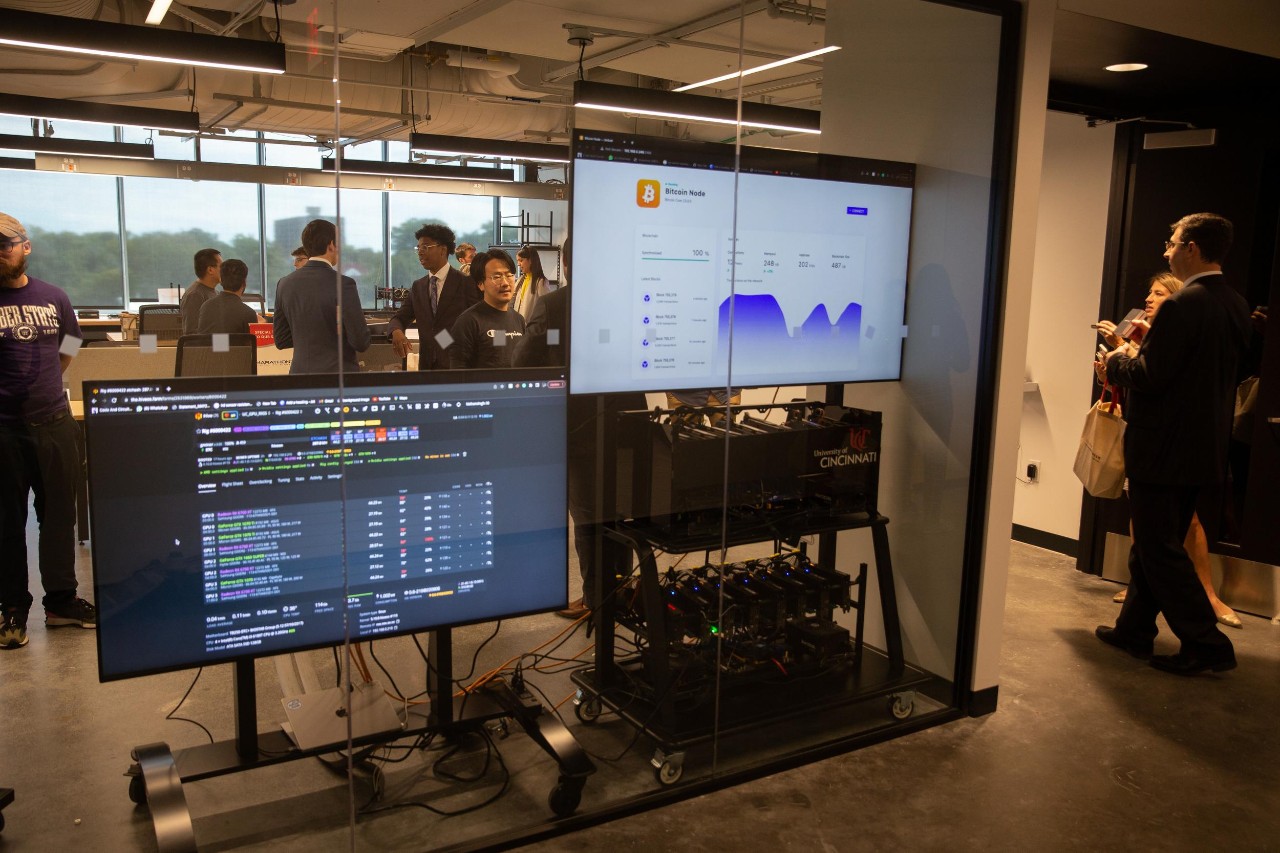
Election results show potential of prediction markets, blockchain
UC economist expects cryptocurrencies to gain adoption in the coming years
A prediction market was more accurate in forecasting the 2024 presidential election than traditional polls and pundits.
Prediction markets, also known as betting markets, are where contracts that are contingent on the occurrence of events in the future can be traded.
The potential displayed by that success in forecasting the election, along with an administration friendlier to cryptocurrencies, could lead to greater adoption for them, a University of Cincinnati economist said.
Michael Jones, PhD, a Carl H. Lindner College of Business assistant professor of economics and director of the Cryptoeconomics Lab at UC Digital Futures, said the success of a blockchain-based prediction market, Polymarket, in predicting the outcome of the election showed that cryptocurrencies and blockchain technologies have more potential than just investments.
“What’s exciting is you’re seeing a real-world use case that’s getting a lot of attention that shows the value and utility of using a blockchain,” Jones said.

People gather in the Cryptoeconomics Lab during the grand opening of UC Digital Futures. Photo/Andrew Higley/UC Marketing + Brand
Polymarket is the world's largest prediction market. Users can take a position on whether or not an event will occur. If they’re right, they get paid instantaneously. It's built on a blockchain, an unchanging digital ledger of economic transactions that records not only financial transactions but anything of value, in a global and verifiable system.
As Election Day approached, Trump was trading at approximately 60 cents on the dollar on Polymarket. Those who bet on Trump made approximately 40 cents profit per share once he won the election.
The market gave Trump greater odds to win than most polls, which had the election at close to 50-50 odds, and was closer to the final Electoral College tally.
“The polls are just people’s opinions; the pundits had their opinions, but there really are no consequences if they got it wrong,” Jones said. “Maybe they took a little heat in the media. But if you got it wrong in the prediction market side, then you lost significant amounts of money.
“What people started to realize is there’s information contained in these prediction markets, so we should take them seriously.”
Prediction markets can be used for more practical matters, too, Jones said.
For example, companies have used them to gauge the likelihood that a product will launch in the coming year. Typically, employees are incentivized to present optimistic outlooks to their employers. Prediction markets are more likely to get an unbiased opinion.
“The advantage is it’s built on the wisdom of the crowd,” Jones said. “If everybody is able to use their own secret information, their own personal experiences of what they know, it sort of aggregates all of the individuals and really puts money on the line.
“What you’re really doing is democratizing the information collection.”
I think a lot of the regulations around crypto companies being located in the U.S. will be improved, so it will open up more economic activity for those companies.
Michael Jones Director of the Cryptoeconomics Lab at UC Digital Futures
Also, some companies have used prediction markets to hedge against risk, Jones said. They might take a position that pays out if something occurs, such as a natural disaster or unfavorable court ruling, that otherwise would harm their business.
The Defense Advanced Research Projects Agency (DARPA), which is part of the U.S. Department of Defense, experimented with using prediction markets to predict things such as terrorism, coups and recessions.
The DARPA project was controversial as there were objections to people profiting off tragedies such as terrorism. Still, other people maintain the knowledge gained from the prediction market is more valuable than the potential downsides.
“Economists took both sides of this,” Jones said. “If you need to get this information out, are you willing to accept that the trade-off is someone might profit for the higher likelihood that you could save lives — because you know there’s a high probability an event is going to occur?”
For the past couple years, the Commodities Futures Trading Commission has prohibited American citizens from participating in some prediction markets. However, Jones said it would be naive to think Americans haven’t participated, including in the election prediction market, as tools such as virtual private networks allow users to hide their locations online.
During Joe Biden’s presidential administration, the U.S. government, including the Securities and Exchange Commission, has been aggressive in pursuing cases against cryptocurrency companies and pursuing regulations. There likely will be fewer regulations during the Trump administration, Jones said.
“Many investors are anticipating that a lot of those cases will be dropped,” he said. “I think a lot of the regulations around crypto companies being located in the U.S. will be improved, so it will open up more economic activity for those companies.”

Michael Jones, PhD, is a Carl H. Lindner College of Business assistant professor of economics and director of the Cryptoeconomics Lab at UC Digital Futures. Photo/Andrew Higley/UC Marketing + Brand
Jones expects it will be easier for cryptocurrency companies to locate in the United States and build their businesses here. He also expects more companies and individuals to adopt cryptocurrencies as an asset class.
Independent from politics, Jones also is adding new opportunities for students at UC. He’s building multidisciplinary courses to teach students about blockchains and cryptocurrencies, considering legal, economic, political science and ethical issues of the technologies.
In the spring, Jones will lead a group of students to Switzerland, home of Crypto Valley, to learn more about how cryptocurrencies and blockchains can be used in the global economy.
UC’s Cryptoeconomics Lab also is exploring the effect of empowering AI agents with a cryptocurrency wallet.
“Currently, most generative AI platforms, such as ChatGPT and Claude, create text or images in response to a user prompt,” Jones said. “But in the future, imagine the economic potential of autonomous economic agents. They can be programmed to automatically execute financial transactions and rebalance investment portfolios based on intelligence gained from a user’s previous investment decisions.”
Featured image at top: Michael Jones speaks to a visitor in the Cryptoeconomics Lab at UC Digital Futures. Photo/Andrew Higley/UC Marketing + Brand
Impact Lives Here
The University of Cincinnati is leading public urban universities into a new era of innovation and impact. Our faculty, staff and students are saving lives, changing outcomes and bending the future in our city's direction. Next Lives Here.
Related Stories
Election results show potential of prediction markets, blockchain
December 6, 2024
A prediction market was more accurate in forecasting the 2024 presidential election than traditional polls and pundits. The potential displayed by that success in forecasting the election, along with an administration friendlier to cryptocurrencies, could lead to greater adoption for them, a University of Cincinnati economist said. Michael Jones, PhD, a Carl H. Lindner College of Business assistant professor of economics and director of the Cryptoeconomics Lab at UC Digital Futures, said the success of a blockchain-based prediction market, Polymarket, in predicting the outcome of the election showed that cryptocurrencies and blockchain technologies have more potential than just investments.
UC students' cryptocurrency advice leads to big gains
April 4, 2024
Using recommendations from University of Cincinnati students, a cryptocurrency fund has grown from $50,000 to more than $120,000 in less than 15 months. As part of an economics course, Economic Applications of Blockchain, UC students are challenged to research potential cryptocurrency investments for a fund owned by UC’s Kautz-Uible Economics Institute.
UC students win hackathon in San Francisco
July 22, 2024
With an app that combats food waste and incentivises donations to food banks, two University of Cincinnati students were part of a team that won an artificial intelligence and blockchain hackathon competition in San Francisco. Daniel Vennemeyer, a computer science, economics and mathematics student who also is pursuing a master’s degree in AI through UC’s ACCEND program, and Phan Anh “Rai” Duong, a computer science student, were part of a team that won the grand prize in the EasyA x VeChain Bay Area Hackathon.
